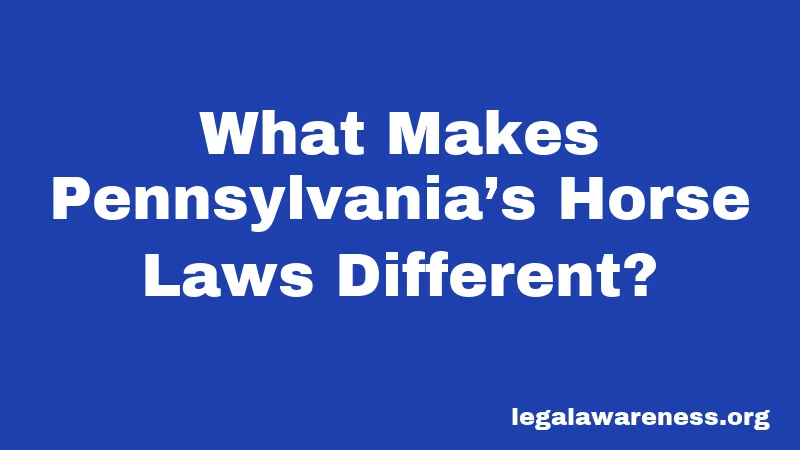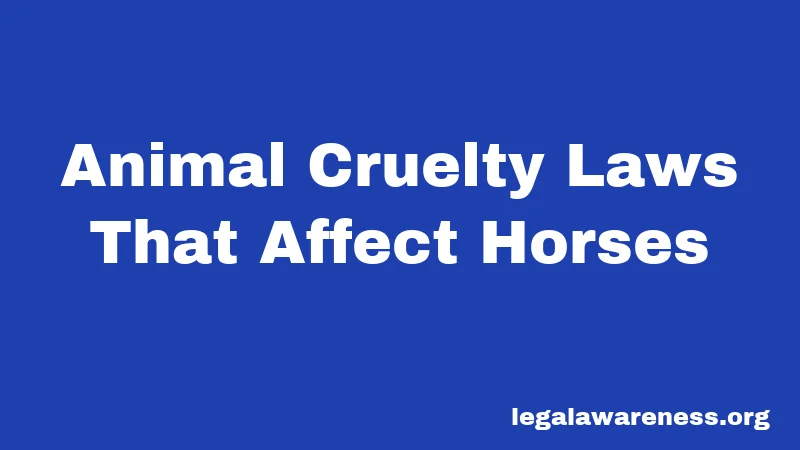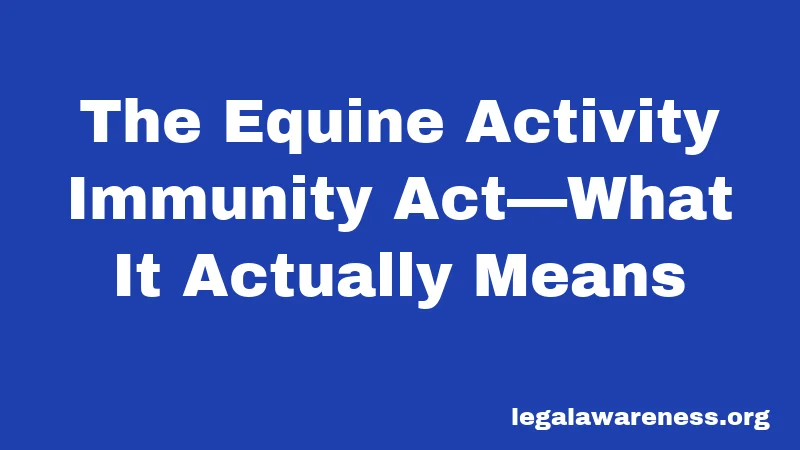Horse Laws in Pennsylvania (2026): Everything You Need to Know Right Now
Most people have no idea how strict Pennsylvania’s horse laws actually are. Seriously. Whether you own a horse, board one, or just enjoy riding, there are rules you need to understand. Breaking these laws can cost you big time—we’re talking fines, criminal charges, and even jail time in serious cases. Let’s break down exactly what you need to know.
What Makes Pennsylvania’s Horse Laws Different?

Pennsylvania takes horse welfare seriously. The state has one of the largest equine industries in the country, with around 220,000 horses. That’s why the laws are so comprehensive. They cover everything from how you care for your horse to how you transport it. Honestly, this is the part most people miss.
The rules come from two main sources. First, there’s Pennsylvania’s animal cruelty laws. Second, there’s something called the Equine Activity Immunity Act. Think of it like a traffic ticket versus a speeding violation—they address different things, but both matter.
Basic Horse Care Requirements
What Your Horse Needs to Survive
This one’s straightforward. If you own a horse in Pennsylvania, you have a legal duty to provide three things. Your horse needs food and clean water. It needs shelter from bad weather. And it needs proper veterinary care when sick or injured.
Don’t think these requirements sound basic? They’re actually legally binding. Violate them, and you could face animal neglect charges. Honestly, this catches people by surprise.
If your horse doesn’t get these basics, the offense starts as a summary violation. That might sound minor, but if the horse gets hurt or faces immediate danger, it jumps to a third-degree misdemeanor. You could face up to a year in jail and a $2,500 fine. Pretty serious, right?
Health Checks and Veterinary Care
You’re probably wondering what counts as “proper” veterinary care. Here’s the reality: if your horse is limping, sick, or clearly in pain, you need to call a vet. You can’t just wait and hope it gets better.
Pennsylvania law is clear on this point. Horses showing signs of serious disease, lameness, or debility need immediate attention. Walking around with an injured horse hoping it improves isn’t legal. Neither is ignoring obvious health problems.
Most horse owners work with vets on routine vaccinations too. Tetanus, encephalomyelitis, and rabies shots are pretty standard. Your vet can recommend what your specific horse needs based on age, location, and activity level.
Animal Cruelty Laws That Affect Horses

Basic Cruelty—What Gets You in Trouble
Here’s where things get serious. Pennsylvania law makes it a crime to intentionally mistreat, beat, abandon, or abuse any animal—including horses. This isn’t just about obvious torture. The law covers a lot of ground.
You could be charged with cruelty for overloading a horse with work it can’t handle. You could be charged for beating a horse. You could be charged for abandoning a horse. The key word is “intentionally, knowingly, or recklessly.”
A first-offense cruelty charge is typically a summary offense. But if the horse gets hurt or faces serious danger? Then it becomes a second-degree misdemeanor. You’re looking at jail time and substantial fines. This part can be tricky, honestly.
Aggravated Cruelty—The Most Serious Offense
Aggravated cruelty is when things get really bad. This covers torture, severe injury, or death. If a horse dies because of your actions, you’re facing felony charges.
A third-degree felony in Pennsylvania carries up to seven years in prison and a $15,000 fine. Plus, the court can take your horse away permanently. Many judges also prohibit convicted abusers from owning animals ever again.
Wait, it gets worse. Upon conviction, you must pay for the cost of the horse’s care and destruction. If you tortured a horse and it needed months of rehabilitation before euthanasia, you’re paying those bills.
Working Horses Too Long
Pennsylvania has a specific law about this. You can’t make a horse work more than 15 hours in a single 24-hour period. You also can’t work a horse more than 90 hours in one week.
Sound like a lot? Consider that a typical riding session is two to three hours. This law basically prevents people from abusing horses through overwork. A violation is a summary offense.
Selling a Lame or Diseased Horse
Trying to sell a horse that’s too sick or lame to work? That’s illegal. Pennsylvania specifically prohibits offering for sale or selling a horse that can’t be worked without violating animal cruelty laws.
This applies whether the horse has a temporary injury or a permanent condition. You can’t pass the problem to someone else. If you sell that horse anyway, you’ve committed a summary offense.
Pennsylvania’s Double-Deck Trailer Ban
Why This Law Exists
Pennsylvania banned double-deck trailers (also called “possum belly” trailers) back in 2001. These trailers have two levels of compartments, and horses on the upper level can hit their heads during transport. It’s genuinely dangerous.
Every violation means a third-degree misdemeanor charge for each horse transported illegally. So if you haul two horses in a double-deck trailer, that’s two separate charges. This isn’t a fine you can pay off—this is a criminal record.
What You Can Use Instead
Use a standard horse trailer with one level of compartments. Make sure it has sturdy partitions so horses don’t shift during braking. Ensure proper ventilation so horses don’t overheat. Keep the floor from getting slippery.
These aren’t just recommendations. Pennsylvania law requires safe transportation. Trailers also need adequate lighting, escape routes, and water access for long trips.
The Equine Activity Immunity Act—What It Actually Means

How This Law Protects Horse Facilities
Here’s something important: Pennsylvania has a law that protects horse owners and boarding facilities from certain lawsuits. But there’s a catch—you have to follow specific rules, or you lose protection.
The law only covers people involved in equine activities. That includes boarding horses, trail riding, horse shows, breeding, and even grooming. If you operate one of these activities, you can potentially avoid liability for injuries that happen during normal horse activities.
The Sign Requirement—Non-Negotiable
This part is critical. You must post signs that say, “You assume the risk of equine activities pursuant to Pennsylvania Law.” These signs need to be 2 feet by 3 feet in size. You need at least two of them in two separate locations where people can clearly see them.
If you don’t post these signs correctly, you lose all protection under the law. Seriously. A lawyer can’t help you if the signs are missing or too small. This is one rule with zero flexibility.
What This Law Does and Doesn’t Cover
The immunity law protects you from lawsuits when someone gets hurt doing normal equine activities—assuming they knew the risks. But here’s what it doesn’t cover: if you provide bad equipment, a horse that’s unsafe to ride, or faulty saddles and bridles, the law won’t protect you.
Basically, the law protects you from accidents that happen even when you’re doing everything right. It doesn’t protect negligence. This distinction matters a lot.
How to Keep Horses in Philadelphia (Different Rules)
If You’re in Philadelphia Specifically
Philadelphia has its own city ordinances that go beyond state law. If you keep horses within Philadelphia city limits, you need to follow these additional rules.
You need at least one quarter acre of open space per horse—unless the horse is only staying less than 24 hours. All open space must be fully enclosed so the horse can’t escape.
You need shelter available at all times. You must provide food and water. You need to clean manure daily. The rules are pretty detailed, and violations can result in significant penalties.
Philadelphia License Requirements
If you operate a commercial stable in Philadelphia, you need a license from the Department of Licenses and Inspections. This costs money and involves paperwork. Stable operators must have a full-time manager and proper facilities.
Transportation and Movement Rules
Moving Horses Between States
If you’re moving a horse across state lines, Pennsylvania requires health documentation. You might need a Coggins test, which checks for equine infectious anemia.
Check with the state where you’re going. Each state has different requirements. Some require recent vet certificates. Others want specific vaccinations documented.
Commercial Horse Hauling
If you’re hauling horses for money—or if you’re a professional trainer using your truck for business—federal regulations kick in. You might need commercial driver’s licenses and electronic logging devices. These rules exist because commercial hauling is riskier than occasionally taking your own horse to shows.
This is actually important. If you’re making money transporting horses, you could face federal penalties in addition to state violations.
Special Topics in Pennsylvania Horse Law
Abandoned and Unpaid Board Horses
Boarding stable operators face a real problem: horses abandoned without payment. Pennsylvania law does protect stable owners through agricultural liens. If someone boards a horse and doesn’t pay, you can eventually claim ownership under specific legal procedures.
But here’s the catch: you have to follow the right process. You can’t just sell an abandoned horse. You need to consult an attorney. You need to work through district justice or court systems. The process takes time while the horse still needs daily care.
Honestly, this is why many barn owners require credit checks and references before boarding. It saves massive problems down the line.
Microchipping Horses
Starting December 1, 2025, horses competing in USEF-licensed competitions must be microchipped. This isn’t a state law—it’s a United States Equestrian Federation requirement. But if you’re competing, you need to know about it.
Microchipping helps identify stolen or lost horses. It’s becoming standard in the equestrian world. Most vets can microchip a horse in minutes during a routine visit.
Fireworks and Your Horses
Consumer fireworks in Pennsylvania are recognized as a major cause of distress to horses. If someone sets off fireworks near your property knowing you have horses, that could potentially be considered animal cruelty. The law doesn’t specifically address this, but it’s a gray area with serious implications.
The bottom line: keep detailed records if someone’s fireworks scare your horses. Document any injuries or stress-related health issues. Contact local police if you believe someone is intentionally causing distress to your animals.
Penalties for Breaking Horse Laws
Summary Offenses (Least Serious)
These carry fines, community service, and possibly minor jail time. Examples include working a horse too long or transporting one in an unsafe manner.
Misdemeanors (More Serious)
Second and third-degree misdemeanors involve jail time of up to six months or a year. Fines range from $1,000 to $2,500. You’ll likely have a criminal record.
Felonies (Most Serious)
Third-degree felonies for aggravated cruelty mean up to seven years in prison and $15,000 fines. You lose the right to own animals. Courts can also order you to pay veterinary bills and animal care costs.
How to Make Sure You’re Complying
Get Everything in Writing
If you’re boarding a horse, have a written contract. Include payment terms, care expectations, and what happens if the horse gets sick. Include who makes medical decisions if the owner is unavailable.
Ask an attorney to review the contract before signing. It costs some money upfront but saves massive problems later.
Work With Your Veterinarian
Your vet is your best resource for understanding what “proper care” means. Different horses have different needs based on age, health, and activity level. Your vet can help you document care standards.
Keep records of all veterinary visits, vaccinations, and deworming treatments. These records prove you’re following the law if anyone questions your care.
Document Everything
Photograph your facilities. Keep records of farrier visits and hoof care. Save receipts for feed and supplies. Keep vaccination certificates in a safe place.
If someone ever accuses you of neglect or abuse, documentation proves you’re doing the right thing. It’s your best defense.
Know Your Local Ordinances
Pennsylvania state law is just one layer. Your county or municipality might have additional rules. Philadelphia has totally different requirements than rural areas.
Contact your local animal control office or county extension office. Ask specifically about horse-related regulations in your area. Don’t assume state law is enough.
Frequently Asked Questions
Can I keep a horse in my backyard? It depends on your location. Rural areas usually allow it. Cities like Philadelphia have specific space and licensing requirements. Check your local ordinances or contact animal control.
What if my horse gets injured and I can’t afford the vet? Pennsylvania law requires proper veterinary care, but it doesn’t provide funds to pay for it. However, many vets work with owners on payment plans. Some animal rescue organizations provide emergency assistance.
Can I ride my horse on public roads? Yes, but you need to follow traffic laws just like any other road user. Wear visible clothing or reflective gear. Stay aware of traffic. Check local ordinances for any specific rules about equestrian traffic.
What should I do if I see a horse being abused? Contact local police or your county animal control immediately. You can also contact the Pennsylvania Society for the Prevention of Cruelty to Animals (PSPCA) in your area. They have investigators who can take action.
Am I responsible if someone gets hurt riding my horse? Possibly, but the Equine Activity Immunity Act provides some protection if you have the required signs posted and the person assumed the risk. This is complex, so talk to an attorney who handles equine law.
Now You Know the Basics
Pennsylvania horse laws are serious. Violations can cost thousands of dollars in fines, result in criminal records, and even land you in prison. But here’s the good news: following the law is actually pretty straightforward.
Provide food, water, shelter, and veterinary care. Don’t work horses excessively. Don’t sell lame or diseased horses. Transport safely. Keep proper documentation.
Most horse owners who get in legal trouble didn’t mean to. They just didn’t know the rules. Now you know them. Stay informed, stay safe, and when in doubt about what the law requires, ask an attorney or your county extension office.
References
- Pennsylvania Consolidated Statutes Title 18 Chapter 55 (Animal Cruelty Laws)
- Pennsylvania Equine Activity Immunity Act (4 P.S. § 601-607)
- Pennsylvania Equine Council – FAQ on Horse Laws
- Pennsylvania Society for the Prevention of Cruelty to Animals – Animal Cruelty Laws
- Philadelphia Code Chapter 10-100 (Horse Ownership and Stables)
- Penn State Extension – Horse Care and Boarding Information
- Animal Legal & Historical Center – Pennsylvania Horse Laws
